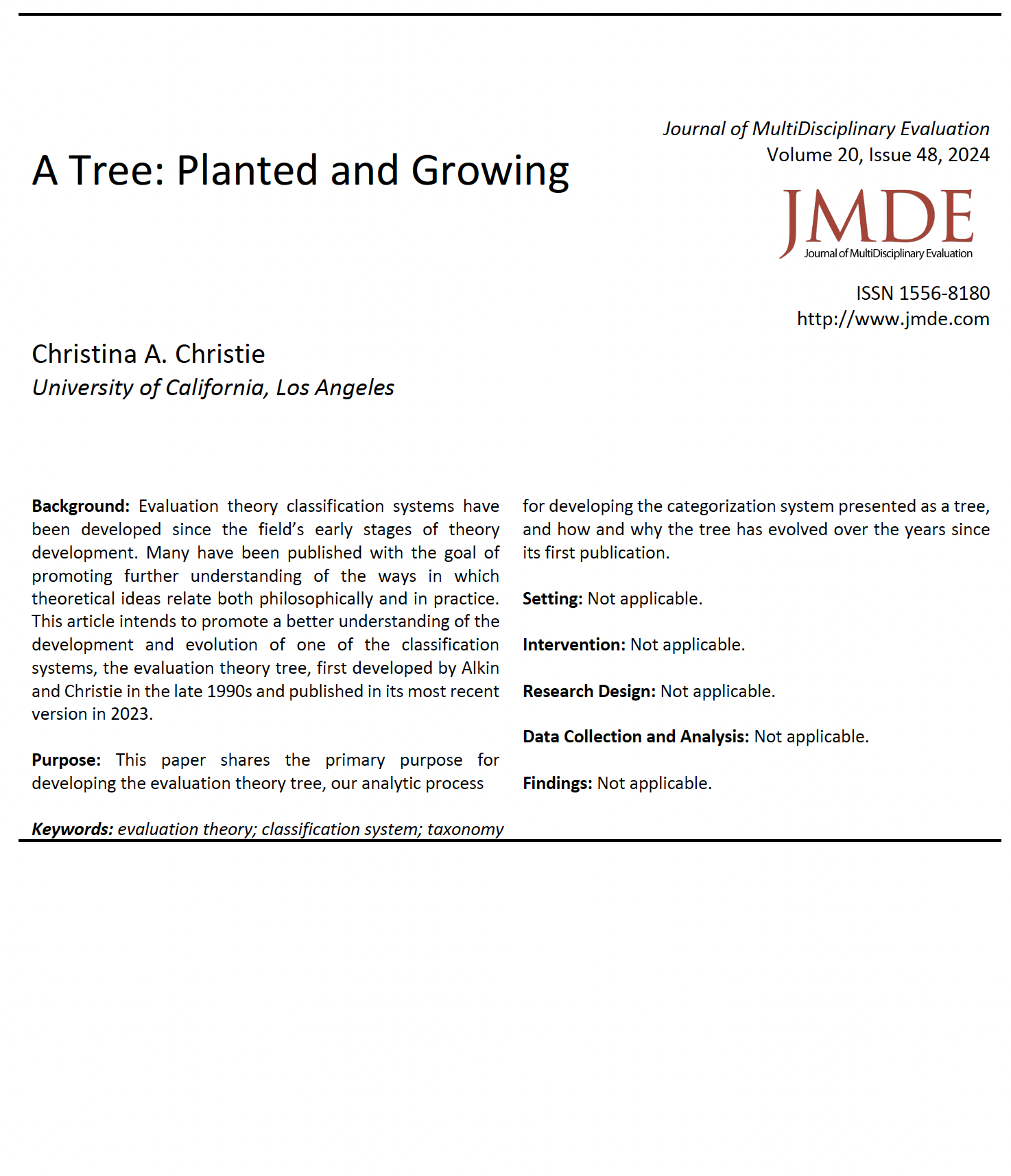A Tree: Planted and Growing
Main Article Content
Abstract
Background: Evaluation theory classification systems have been developed since the field’s early stages of theory development. Many have been published with the goal of promoting further understanding of the ways in which theoretical ideas relate both philosophically and in practice. This intends to promote a better understanding of the development and evolution of one of the classification systems, the Evaluation Theory, developed by Alkin and Christie first in the late 1990s and is in its most recent version, published in 2023.
Purpose: This paper shares the primary purpose for developing the Evaluation Theory Tree, our analytic process for developing the categorization system presented as a tree, and how and why the tree has evolved over the years since its first publication.
Downloads
Article Details

This work is licensed under a Creative Commons Attribution-NonCommercial 4.0 International License.
Copyright and Permissions
Authors retain full copyright for articles published in JMDE. JMDE publishes under a Creative Commons Attribution-NonCommercial 4.0 International License (CC BY - NC 4.0). Users are allowed to copy, distribute, and transmit the work in any medium or format for noncommercial purposes, provided that the original authors and source are credited accurately and appropriately. Only the original authors may distribute the article for commercial or compensatory purposes. To view a copy of this license, visit creativecommons.org
References
Alkin, M. (1972). Evaluation theory development. In C. Weiss (Ed.), Evaluating action programs: Readings in social action education (pp. 105–117). Allyn & Bacon. (Reprinted from Evaluation Comment, 1969.)
Alkin, M. (1991). Evaluation theory development II. In M. McLaughlin & D. Phillips (Eds.), Evaluation at quarter century: The 90th yearbook of the National Society for the Study of Education (pp. 89–112). University of Chicago Press.
Alkin, M. (2004). Evaluation roots. In M. Alkin (Ed.), Evaluation roots: Tracing theorists’ views and influences. Sage. https://doi.org/10.4135/9781412984157
Alkin, M. C. (Ed.). (2012). Evaluation roots (2nd ed.). Thousand Oaks, CA: Sage.
Alkin, M.C. & Christie, C. (Ed.) (2023). Evaluation roots (3rd ed). Theory influencing practice. Guilford Press.
Alkin, M., Christie, C., & Vo, A. (2012). Evaluation theory: A wider roots perspective. In M. Alkin (Ed.), Evaluation roots: A wider perspective of theorists’ views and influences (pp. 386–393). Sage.
Alkin, M., & Ellett, F. (1979). An inquiry into the nature of evaluation theorizing. Studies in Educational Evaluation, 5, 151–156. https://doi.org/10.1016/0191-491X(79)90022-1
Alkin, M., & Ellett, F. (1985). Evaluation models and their development. In T. Husén & T. N. Postlethwaite (Eds.), International encyclopedia of education: Research and studies. Pergamon Press.
Christie, C., & Alkin, M. (2012). An evaluation theory tree. In M. Alkin (Ed.), Evaluation roots: A wider perspective of theorists’ views and influences (2nd ed., pp. 11–58). Sage.
Christie, C. A., & Rose, M. (2003). Learning about evaluation through dialogue: Lessons from an informal discussion group. American Journal of Evaluation, 24(2), 235–243. https://doi.org/10.1177/109821400302400207
Covarrubias, M. (1940). The tree of modern art. https://www.davidrumsey.com/luna/servlet/detail/RUMSEY~8~1~269030~90043127
Heberger, A. E., Christie, C. A., & Alkin, M. C. (2010). A bibliometric analysis of the academic influences of and on evaluation theorists’ published works. American Journal of Evaluation, 31(1), 24–44. https://doi.org/10.1177/1098214009354120
Rawls, J. (1971). A theory of justice: Original edition. Harvard University Press. https://doi.org/10.2307/j.ctvjf9z6v
Shadish, W. R., Cook, T. D., & Leviton, L. C. L. (1991). Foundations of program evaluation. Sage Publications, Inc.
Vo, A. T. (2016). Teaching through Discussion: A Mixed Qualitative Methods Study of Educator Facilitation Practices in a Small Group Learning Context Using Ethnographic and Conversation Analytic Approaches. Studies in Educational Ethnography, 13, 213–248. https://doi.org/10.1108/s1529-210x20150000013008
Worthen, B. R., & Sanders, J. R. (1973). Evaluation as disciplined inquiry. In B. Worthen & J. Sanders (Eds.), Educational evaluation: Theory and practice (pp. 10–39). Charles A. Jones Publishing Company.

